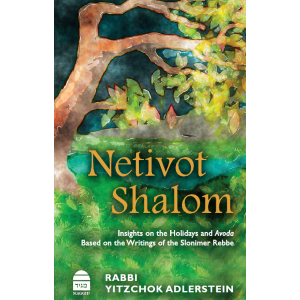Discount to Readers

This is an exercise in unvarnished self-promotion. I don’t like doing it, but marketing is part of the deal with the publisher.
My second volume on the Slonimer Rebbe’s zt”l Nesivos Shalom has just reached the American market. The first was on the Parsha; this one is on significant days and periods in the yearly calendar, and on select topics in Avodas Hashem.
Many of our readers must already be doing the sefer in the original, and do not need my adaptation for the Anglo reader. But there are others who may find it useful. If you order from the Maggid website www.maggidbooks.com (in the philosophy section), you can save 20% and get free shipping by enter the special promo code YA20 through December 30, 2019.



Mazel tov on the publication!
I have already bought this book, receiving it in the mail yesterday. The dedication to it by Rabbi Adlerstein’s children was very moving, and so very true. It was especially meaningful to me, because I actually personally know whom they are describing.
While I will probably wait to start reading the book closer to the Jewish holidays since, after all, that is the topic of the book, what I did notice right away was its layout, which reminds me a lot of the same format used in Rabbi Jonathan Sacks’ Torah commentary. Both Rabbi Sacks and Rabbi Adlerstein are very philosophical in their disposition, and I have heard Rabbi Adlerstein praise such an approach in the works of the Maharal and the Ramchal, with Rabbi Sacks pointing that out in the Torah commentary of the Spanish Rishon Rabbi Arama as well, and so what I am leading to here is that it is my hope that Rabbi Adlerstein takes it upon himself to write a full-fledged, five-volume Torah commentary which emphasizes a philosophical approach which includes both such traditional Torah commentaries I just mentioned (and others, of course), as well as his own thoughts on this most central book of Judaism.
I’m confused. Nesivos or Netivot? Or is it Netivos or Nesivot?
(meanwhile yasher koach,)
1) I’m covering all bases 2) Changing the spelling to Netivot was non-negotiable for the publisher. Continuing to call it Nesivos is to help the Rebbe zt”l better take part in the discussion from his listening post in the older, more traditional neighborhoods of Ashkenazic Heaven
While I myself am ethnically 100% Ashkenazic, I have long thought that the Sephardic way of pronouncing Hebrew is the far superior and accurate one. Honestly, there are times when the Ashkenazic way just annoys me, such as when some will say “Toyreh” instead of “Torah,” or “Roos” instead of “Ruth” Perhaps even worse than that is when some very religious American Jews actually pride themselves on treating their poor mastery of English grammar as some kind of badge of honor, as they take it as a sign that they are not assimilated into American society. And so I fully endorse calling the book in question the Netivot Shalom.
Does publishing with Maggid mean your hat went from dark to light gray? 🙂 mazel tov!
BTW, an acquaintance of mine, a 6th or 7th generation descendant of the talmidai ha’gra, who is also one of Israel’s important nuclear physicists, speaks Sephardic, but davens and leins like his Litvishe ancestors. I think he speaks Sephardic when he learns. I hope to see him in Israel in a bit over a month and I will ask him. 🙂
No, it means that Koren/Maggid has decided to cater to the darker market as well, besides their lighter one. (I’m in good company. Some really substantial people preceded me to Maggid!)
Do you have any insights into his quite extreme views on asceticism, in particular concerning matters of intimacy?
Read Benny Brown’s monograph on the three current protocols on these issues. Slonim is far tamer than Ger, and far more voluntary. The Rebbe wasn’t “liberal,” so much as fully understanding the different madregos of people in the Torah world, and the ups and downs of even bnei aliyah. There is nothing in his writing that I have seen that would suggest that some amount of prishus is not appropriate for the right people who are on a trajectory of ascent, just as the Ramchal sees it as appropriate for some and not for others.
It is part of my own inadequacy, perhaps, that I have never met a person that I could think would benefit from one of the three packages of prishus – nor can I even imagine such a person, at least not among those living with some interaction with the larger world.
Tactfully put.
The Slonimer is wildly popular in my intellectual circles, probably because of its relatively “easy” style, and the way everything (except the rashei teivot) is laid out for the reader. People read Sfas Emes all the time without having to be troubled by the takkanos.
How does this compare to the English volumes that have been coming out as Gems From the Nesivos Shalom over the past few years?
No idea. Never looked at them
I became a “closet” slonimer chosid because of the nesivos shalom. I bought as many slonimer seforim as I can. I find them all striving to greater heights in yiddishkeit.